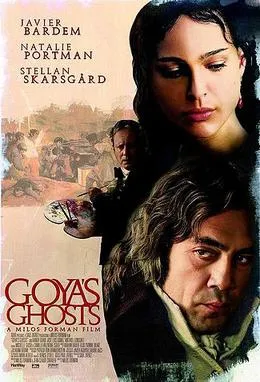Historical accuracy of Goya’s Ghosts

Historical accuracy of Goya’s Ghosts

Characters
Francisco Goya
Francisco Goya was indeed a renowned painter in the Spanish court. He served as the First Court Painter to King Charles IV of Spain. His deafness and artistic style are accurately portrayed.
Brother Lorenzo Casamares
Lorenzo Casamares, the priest who accuses Ines and later fathers her child, is a fictional character. His actions represent the hypocrisy and corruption that could be found within the Church.
Inés Bilbatúa
Ines Bilbatúa, the young woman accused of heresy, is a fictional character. The film uses her story to illustrate the injustices of the Inquisition, but it's not based on a real historical figure.
Tomás Bilbatúa
Tomás is a fictional character, representing the wealthy class of the time and the impact of the inquisition on their families.
Joseph Bonaparte
Joseph Bonaparte's brief reign as King of Spain is a historical fact. The film portrays his presence during the Napoleonic Wars and the shifting political landscape of Spain.
Story
Goya's deafness
Goya did suffer from deafness later in his life. The film depicts this affliction and its impact on his art and psychological state.
Goya's portraits of the Spanish court
Goya painted numerous portraits of the Spanish royal family and aristocracy. The film features some of his most famous works, including 'The Family of Charles IV.'
Goya's 'Black Paintings'
The film references Goya's disturbing 'Black Paintings,' a series of dark and grotesque murals he painted on the walls of his house. These paintings reflect his growing disillusionment with society and the horrors of war.
Goya's evolving artistic style
The film shows how Goya's artistic style evolved over time, reflecting his changing perspectives and the tumultuous events he witnessed. His early court portraits contrast with his later, more disturbing works.
Ines's fate and her daughter's rescue
The specific events surrounding Ines's imprisonment, her daughter's birth, and their eventual reunion are fictional creations of the film. They serve to dramatize the impact of the Inquisition and the social injustices of the time.
Setting
Inquisition's power and influence
While the film portrays the Spanish Inquisition's power and brutality, its influence was waning by the late 18th and early 19th centuries, the period depicted in the film. The Inquisition's role is somewhat exaggerated for dramatic effect.
The Napoleonic Wars
The film depicts the Napoleonic Wars and their impact on Spain. The French invasion and subsequent conflict brought significant upheaval and suffering to the country.
Shifting political landscape
The film captures the turbulent political landscape of Spain during this period, with shifting alliances and power struggles between the monarchy, the Church, and the French invaders.
Overall
Overall historical accuracy
While 'Goya's Ghosts' uses historical figures and events as a backdrop, it takes significant liberties with the narrative and creates fictional characters and storylines. It's best understood as a historical drama inspired by Goya's life and art, rather than a strictly accurate historical account.
